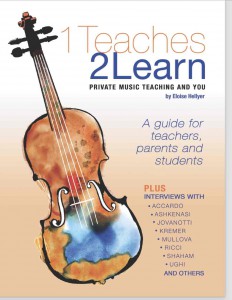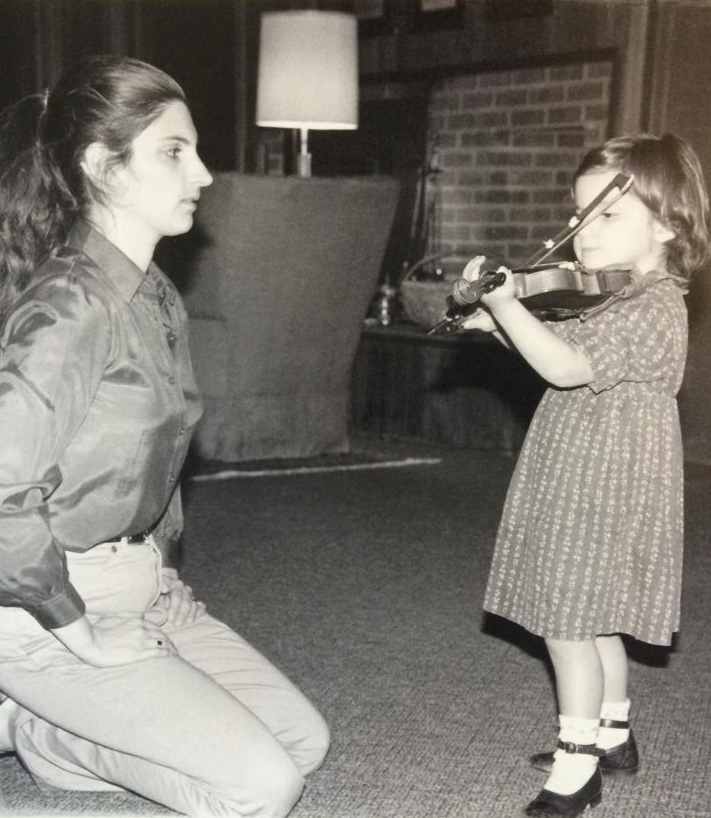Light My Fire…
A violin teacher recently asked me my method for “lighting the fire” in a student – how to get a student excited, enthusiastic or passionate about what we are teaching.¹
To start a fire, you need several things: Fuel and ignition – and something to burn.
Let’s talk about the something to burn first. As we were taught in middle school science class, not all materials will flame as brightly as others. Some materials burn up quickly, others smolder and, while not flaming brightly, may last a long time. So the brightness and duration of the flame you light will be in direct consequence of the type and composition of the substance that has to light up. The same for students: some have a greater capacity and propensity for passion¹ than others. In my experience students come in various packages:
- The ones who come already passionate about music in general, and the violin in particular. I don’t think I have ever had one of these. One reason is that most of them are so young that the only thing they feel passionate about is ice cream and their afternoon naps (i.e., not taking them). Another reason is that most students come to us not to nourish their passions but to find them in the first place. You find passion by trying out lots of stuff until one or more things calls to you. That’s what people think anyway. They often don’t realize the vital importance of the teacher in this process.
- The ones who like music a lot and seem to have an instinctive understanding of what it’s all about. Rare, in my experience, but while they may have a small initial flame, teacher has to work hard to maintain it by not boring them to death with constant, unrelieved technical exercises. Yes, it is possible to kill passion (ask anyone who has been in and fallen out of love). You can’t get and keep your students excited about something unless you continually give them something to be excited about – and it may not be what excited you, so flexibility is a must here.
- The ones who don’t seem to feel passionate about anything. That’s fine. Some people never feel passion in their lives. What’s wrong with that? Everything nowadays, apparently. The most common question you hear at cocktail parties or even, I’m told, job interviews is, “What do you feel passionate about?” God help you if you don’t have an answer. I personally find the question offensive. One of my mothers, herself a musician and daughter of a very successful and well-known artist, once came to her child’s lesson with her older teenage daughter in tow complaining sadly that this lovely girl had no passions, as if this were some kind of defect or incurable disease. I explained to the mother that perhaps this young woman just hadn’t found her passion yet, and even if she never felt really passionate about anything, this didn’t make her a failure in life. She certainly wasn’t apathetic and a lump of clay – she was just, well, normal. And there’s nothing wrong with that. Passion, after all, does not guarantee happiness – it can consume a lot of time and energy without necessarily giving fulfillment or satisfaction. Passionate people are lucky and cursed at the same time: while you may consider yourself fortunate to have a consuming interest and feelings about something, it can also be very difficult to own yourself and your life when you are in the throes of passion. However, it’s our moral obligation as teachers to try to help our more reserved students find a spark of some kind in themselves – there always is one.
So now let’s look at the ignition.
Three things are necessary for you, the teacher, to transmit passion, to light a fire:
- Your feeling passionate about your instrument and music.
- Your desire that your students feel passionate about it, too.
- Your ability to nurture your students’ passion by keeping the whole enterprise interesting.
Sometimes the first two are enough, or even all three. But what if they aren’t? What to do? You need a secret weapon: the ability to talk to your students about the meaning of it all.
We may often think that students should automatically love music as we do. But consider this: how do you fall in love with someone? Just seeing each other across the room and voilà? That may last a little while, but to get him or her to commit to you for the rest of your lives, you’re going to have to talk to object of your desire. And to maintain that relationship, you have to work at it. How? Communication: verbal and physical. We may hand our students lots of technique, let them play a few pieces and expect them to understand what music is all about with little or no explanation. After all, the accepted wisdom says we’re not supposed to talk much at a lesson. But try to convince someone to marry you (and stay married to you) just by looking sexy and letting him/her see how wonderful you are without ever communicating verbally. Go ahead – and let me know how that works for you.
So, back to the original question: how do you light a student’s fire? First, we can realize that there is a great range on the passion spectrum from, “Gosh, I kind of like this” to, “I can’t live without it and think about it 24/7.” That some burn brighter and hotter than others and some have higher ignition points. Your passion is quite strong – it would have to be for you to arrive at your level of playing, not to mention teaching it. You have spent many long and often frustrating hours in a practice room with a goal in mind and passion in your spirit. Is it fair to expect this level of fire from your students? Is it even fair to expect most of humanity to feel this? Would it even be good for the human race to have everyone so passionate? We need all kinds of people in this world – and all levels of passion and fire.
Secondly, while just showing something to a student and expecting them to “get it” may work on some (the lightning bolt of love at first sight), know that many, nay I would say most, students don’t realize they feel music in an emotional way at first and need an intellectual approach. So give it to them. Talk talk talk… Other students feel the emotional aspect but don’t have the discipline. Talk, talk, talk…Others don’t think music is important. TALK TALK TALK. Especially in cases like this last one, you have to proselytize for music as if you were a missionary before something else, like tennis or soccer, grabs them.
However, we are not encouraged to do this. We are told that the teacher who talks a lot doesn’t teach well, that she is wasting time. Nonsense. Okay, now I’m going to pull rank:
I recently interviewed Gidon Kremer (yes, I’m bragging) for a book I have written. I told him of my practice and he agreed with me. Perhaps his playing is not to everyone’s taste, but no one can say he isn’t passionate. I have to amend that – I have another interview with a Very Famous Musician calling Maestro Kremer a cold fish. I don’t agree. But there you go – the vagaries of human passion: one person’s passionate artist is another’s cold fish. This should also tell you something about how easy it is for us to misjudge someone else’s level of passion.
So ask yourself, what do people feel passionate about? Something they see as being of overweening importance. Something that’s important to them in particular. This is where passion starts: with something that you realize is important and then becomes important to you on a personal level. So make music important to your students; talk to them when it’s necessary and even when it’s not. Tell them that playing music is important, that even one sound is important. That playing music is an act of generosity to those in the immediate vicinity and to the universe in general and that we must be careful to make it beautiful. That music is a transmission from our souls. That making music is quite different from making noise. That technique serves to help us transmit emotion and communicate even better. You have to tell them this, physically say it, over and over in different ways until they get it. And they will.
Remember that when you talk with your students (not down to them), you make them feel important. I talk to even my smallest students, perhaps changing my vocabulary and the images, about the importance of music, the importance of musicians – even small students – and their responsibility. When children feel music is important, they realize that their playing is important and it’s a chain reaction: fire lit and then all you have to do is maintain it. After all, when does a child ever get to feel that he or she is doing something important for the universe? And everyone wants to feel they’re doing something important, even toddlers.
This way, you may get some up to your level of passion. But to get even a few of our seemingly emotionally flat students to care a little about music may be a greater triumph for a teacher than producing the next Paganini competition winner, if you’re speaking in relative terms. To help a student have a little passion where there was none is one of the better results of our work and one of the most satisfying. And to have what you may not realize to be a smoldering ember burst into flames even years later, is also a very pleasant and gratifying surprise for the teacher. Therefore, I am happy when even my more reluctant practicers feel passionate about music when they play. And for me, that’s enough. Getting students to realize that something as seemingly insignificant as making a beautiful sound can have a profound effect is the best way I know to light a fire.
And you can also do what I did with one particularly uninspired and almost pathologically timid 14 year old transfer student who liked his lessons but had no fire at all: I had him play the easy part in 4 violin quartets with three very pretty and accomplished girls his age. His transformation was astounding. Thirty years later, he is still playing in amateur orchestras anywhere he can find them, his social media page is only about the violin and nowhere mentions his successful career in the sciences. I consider him to be one of my biggest successes. He didn’t achieve heights, not to mention great ones, on the instrument, but his passion level is amazingly high and he really enjoys himself.
All’s fair in love and war. And teaching…
Post author: Eloise Hellyer
¹ For the sake of brevity, I’m going to use the word passion to describe the emotion or interest we are trying to evoke in our students.
Share this:
Buy it on www.sharmusic.com - eBook format, avaliable worldwide, paperback in North America
COPYRIGHT
ABOUT
A music teacher’s thoughts and observations on the teaching and the study of a musical instrument, hoping to be of help to parents, students and teachers.
PHOTO
AWARDED TOP 25 VIOLIN BLOG
CATEGORIES
TAGS
ARCHIVES
-
Agosto 2022
Agosto 2023
Agosto 2024
April 2015
April 2016
April 2017
April 2019
April 2020
Aprile 2022
Aprile 2023
Aprile 2024
August 2014
August 2015
August 2016
August 2017
August 2018
August 2019
August 2021
December 2014
December 2015
December 2016
December 2017
December 2018
December 2019
December 2020
Dicembre 2022
Dicembre 2023
Dicembre 2024
Febbraio 2022
Febbraio 2023
Febbraio 2024
February 2015
February 2016
February 2018
February 2019
February 2020
February 2021
Gennaio 2022
Gennaio 2023
Gennaio 2024
Giugno 2022
Giugno 2022
Giugno 2023
Giugno 2024
January 2015
January 2016
January 2017
January 2018
January 2019
January 2020
July 2015
July 2017
July 2019
June 2016
June 2017
June 2018
June 2019
June 2020
June 2021
Luglio 2022
Luglio 2023
Luglio 2024
Maggio 2022
Maggio 2023
Maggio 2024
March 2015
March 2016
March 2017
March 2018
March 2019
March 2020
March 2021
Marzo 2022
Marzo 2023
Marzo 2024
May 2015
May 2016
May 2018
May 2019
May 2020
November 2014
November 2015
November 2016
November 2017
November 2018
November 2019
November 2021
Novembre 2022
Novembre 2023
Novembre 2024
October 2014
October 2015
October 2017
October 2018
October 2019
October 2020
October 2021
Ottobre 2022
Ottobre 2023
Ottobre 2024
September 2014
September 2015
September 2016
September 2018
September 2019
September 2020
September 2021
Settembre 2022
Settembre 2023
Settembre 2024
RECENT POSTS
Terry G and Me, or Terry Gilliam on Where (or What) Practicing the Piano Will Get You…
The Teaching We Don’t Do Is More Important Than We Think
Overwhelmingness or What Teaching and Motherhood* Have in Common
Cellphone Serenity
How to Build Your Reputation – the Kind You Want
Desperate Times, Desperate Measures. Or How to Deal With Your Strong-Willed Stubborn Student and Survive
“Why Does My Teacher Get So Frustrated?” Letter to a Perplexed Student
Mount Rush-no-more….And How to Get There
Realizzato con VelociBuilder - Another Project By: Marketing:Start! - Privacy Policy




